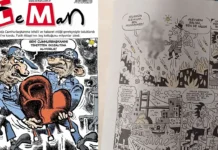The government decree granting immunity to civilians who take part in suppressing coup attempts will not be changed, Turkish Prime Minister Binali Yıldırım has said, insisting that the decree will only apply to those who took part in the July 15, 2016 coup attempt and the day after, July 16.
According to a report by state-run Anadolu news agency, Yıldırım told journalists on Wednesday that “There will be no amendments. There is no problem with its wording,” .
The Article 121 of Decree Law No. 696, which has been interpreted as a “licence to kill” for radical Islamist and neo-nationalist pro-government circles, reads: “Regardless of their official duties, or appointments, any individuals who took part in suppressing the attempted coup d’état on July 15, 2016, terror acts, and other acts which are considered to be a continuation of these, will be subjected to the first clause [on immunity].”
PM Yıldırım’s comments came after the government received criticisms for providing blanket immunity and impunity to civilians who took part in suppressing the July 15, 2016, coup attempt, which frees them from criminal liability.
But opposition groups criticized the article for indicating that it covered “following events,” saying that it was vaguely-worded and can be open to interpretations. Former President Abdullah Gül also joined the criticisms, saying that the wording was “ambiguous.”
“The ambiguity in the wording of decree number 696, which is incompatible with legal terminology, is worrisome with regards to the understanding of the state of law. I hope that it will be revised in order to prevent problems that can upset us all from happening in the future,” Gül said on his Twitter account on Dec. 25.
Yıldırım responded to Gül by saying that “There is nothing wrong with the wording of the decree,” and he added that “There will be no revision.”
Reminding that the law regulating the state of emergency procedures was legislated by the first state of emergency decrees, numbered 667 and 668, Yıldırım said the new article is using the same terminology as the previous decree.
“The regulation that was made during the coup period had never been discussed, but a small change, which gives protection to civilians who have fought against the putschists and the coup, is being discussed. Why was a problem that was not on the agenda that day is now being brought to the agenda?” Yıldırım said.
“The regulation is aimed at protecting the citizens who ran to the streets, laid down their lives [for Turkey] to prevent the coup and events right after it,” he said, adding that objecting to it now would be the same as asking them why the fought against the coup.
The ruling AKP has also decided to form a “unity in rhetoric” after AKP lawmaker Burhan Kuzu stated on Monday on his official Twitter account that the article “will also protect civilians who will fight if another coup attempt happens.”
Kuzu’s words stirred more debate at a time when AKP officials are insisting that the article only covers the two days of the coup attempt, July 15 and July 16. The AKP management then warned its members to follow the official stance of the article. Kuzu later erased his post and kept posts about how the article applies to civilians who fought on the night of July 15.
Meanwhile, Turkish Bar Association head Metin Feyzioğlu said on Wednesday following an emergency meeting held in Ankara that the state of emergency and the decree numbered 696 must be removed immediately as they go against the Turkish Constitution. “The state of emergency, as it is, is an obstacle in the way of our fight against terrorism because it damages Turkey’s reputation,” Feyzioğlu said.
“This is a situation that terror organizations would benefit from as they can establish the platform to gain foreign support in such an environment,” Feyzioğlu added.
Feyzioğlu also sharply criticized the latest emergency decree numbered 696 published on Dec. 24, saying it gives the government’s authority to civilians. Feyzioğlu said he believes the regulation puts the country under threat.
“We all know how to read and write. There is no clarification in the decree that says it will cover only the night of the coup,” the bar head stated, adding that that this “irresponsible” regulation would hurt the penalty and compensation processes in the future.
Criticizing the use of emergency decrees in issues not related to the state of emergency, Feyzioğlu said it is forbidden in the constitution. “This also goes against the European Human Rights Treaty,” he said. “A government that considers itself a ‘government’ can never install such measure,” he added.
Another regulation the new decree brings is a change to outfits worn by convicts. A total of 58,500 prisoners and convicts will wear single-type uniforms during court appearances. Feyzioğlu has also said forcing convicts to wear uniforms will give the impression that the suspect is guilty. “This strictly violates a person’s right for defense,” Feyzioğlu said.
Feyzioğlu then called on the Turkish Parliament to convene and discuss the decree and the state of emergency. The bar head also called on the Supreme Court to take responsibility in the case.
Rıza Türmen a former European Court of Human Rights (ECHR) judge had said that the Turkish government’s latest decree granting legal immunity to civilians means the abolishment of the rule of law in Turkey. “This regulation takes us back to a primitive state – a state of nature where one may kill another without legal consequences,” Türmen was quoted as saying by leftist newspaper Evrensel.
“This is terrifying” Türmen said of the clause. “An earlier decree granted immunity regarding state officials’ acts. This was already wrong. Now, granting the same immunity to civilians can have grave consequences, an official policy of immunity can lead to chaos in the country.”
Türmen noted that the decree laws issued during Turkey’s state of emergency should remain limited to the period of emergency and be lifted when the state of emergency ends. “But these regulations amend laws permanently,” highlighted Türmen.
The main opposition Republican People’s Party (CHP) on Monday slammed the government for the state of emergency decree issued on Sunday, saying it paves the way for armed civilian gangs in Turkey.
“Where do you find this sort of article? In fascist, military states, where states aim to frighten civilians with paramilitary forces. This is an article paving the way to the establishment of armed civilian gangs by the government, an article preparing a substructure for it,” said Bülent Tezcan, deputy chairman and spokesperson of the CHP, during a press conference.
“This article is a disguised amnesty. It says those who perpetrated such a crime in the past will be forgiven,” added Tezcan.
Reactions to the new decree that gives immunity and impunity to civilian violence in the context of the coup attempt and terrorist attacks are not limited to the CHP.
At an Ankara press conference, pro-Kurdish Peoples’ Democratic Party (HDP) spokesperson Ayhan Bilgen called for an extraordinary parliamentary convention, urging a unified reaction to what he labeled as a step toward further polarization, chaos, and even civil war. “Tomorrow can be too late,” he warned. No guarantee of security was left for government critics or opposition groups in case they come under attack, Bilgen argued.
Kerem Altıparmak, a human rights lawyer from Ankara University, underlined in a tweet that with the new decree the worst human rights violations and all kinds of crimes have been legitimized under the cover of fighting terrorism. Recalling that the Turkish Constitutional Court has approved the government’s state of emergency decrees, Altıparmak called on victims and their relatives to go directly to European Court of Human Rights (ECtHR).
The legal definition of an “act of terror” is very vague in Turkey, Altıparmak said on social media, pointing to another problem inherent in the decree. “While prosecutors and courts take years to try journalists, academics on ‘terror crimes,’ politicians are being charged with ‘terror offences’ for their speeches; what will stop mobs from attacking dissidents?” Altıparmak asked.
Human rights advocate Ömer Faruk Gergerlioğlu summarized the new decree in a tweet: “If you make an innocent protest and someone kills you, he may not be punished. What else could be done to show that the state of law has ended?”
“Erdoğan regime has welcomed private participation in witch hunts against Erdogan enemies. Now pro-state vigilantism is formally legal,” tweeted Timur Kuran, a professor of economic and political development at Duke University.















